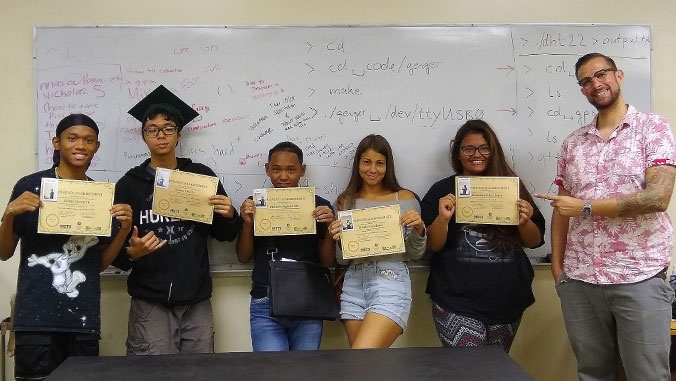
Nānākuli and Waiʻanae high school students spent a transformative week, June 3-7, building and working with computers. They were in a programming and sciences program called “HIGGS” taught by University of Hawaiʻiat Mānoa physics Associate Professor Philip von Doetinchem. The mentorship program, in its fourth year, aims to increase the digital literacy level of high school students in a college setting that resides in natural sciences and computer programming.
The students were shuttled to the UH Mānoa campus daily where they learned how to use highly versatile and affordable Raspberry Pi computers. Starting from the bare computer central processing unit board, students built up a system with multiple sensors and devices and wrote the corresponding computer code to control them.
In an entirely hands-on approach, the group worked with cameras, read-out-temperature and humidity sensors and measured natural radioactivity levels with Geiger counters controlled by the computer. They toured different laboratories in the physics and astronomy department and the Institute for Astronomy, and sat in on a physics lecture. After successfully completing the program, the students were rewarded with one real college credit.
“It is really important to show high school students early on what college is about and to expose them to modern research,” Doetinchem said. “Many of the students never had the chance to talk to scientists before. During this week they could get a first glimpse of some of the exciting things that are happening at UH and work with tools that are used in actual research.”
HIGGS has evolved over the years since it started in 2016. “During the first year, the program was hosted at Nānākuli High School with a one day visit to the UH Mānoa campus, but we then decided to move it to a full week on the Mānoa campus starting from 2017,” Doetinchem said. “This was a great decision and really excites the students about college and applying to UH Mānoa. In addition to all the hands-on work we do, having multiple tours of different facilities during the week was a big plus.”
The project was supported by Doetinchem’s National Science Foundation CAREER award and UH Mānoa’s Office for Student Equity, Excellence and Diversity (SEED) Inclusion, Diversity, Equity, Access and Success. He thanked SEED’s Christine Quemuel and Jennifer Barnett along with Mānoa Educational Talent Search’s Janis Dela Cruz, Tasha Kawamata Ryan and Nicholas Childs and for their support.

